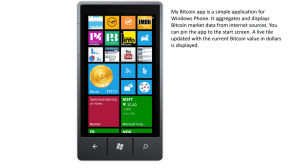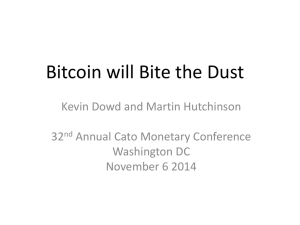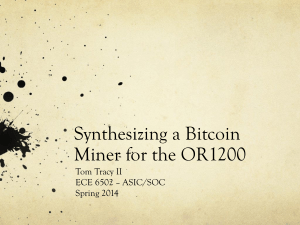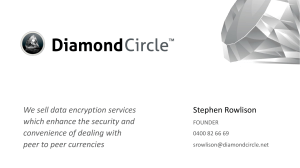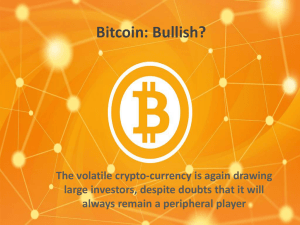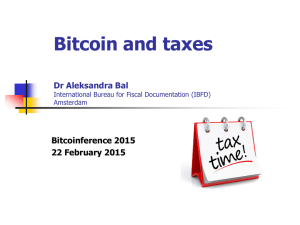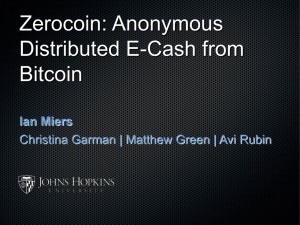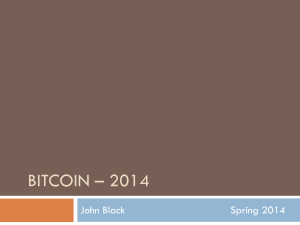Michael Goldstein
advertisement
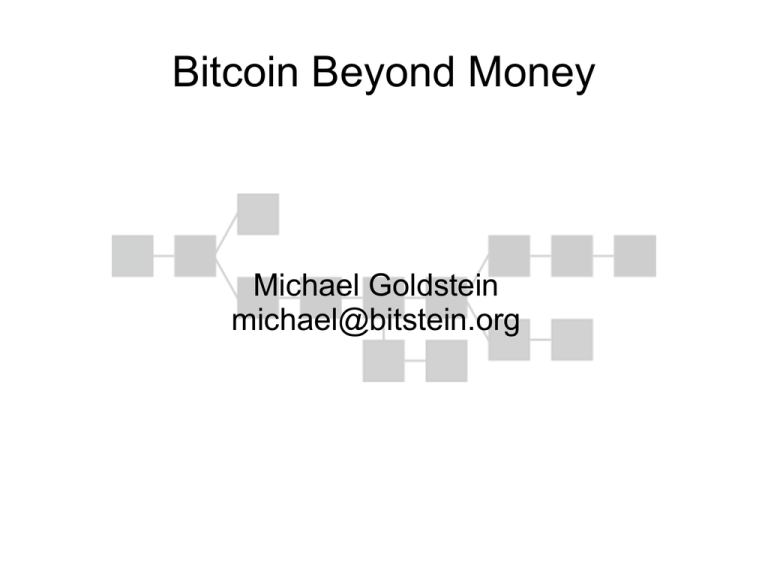
Bitcoin Beyond Money Michael Goldstein michael@bitstein.org A Theory of Property ● Scarcity – – ● Appropriation – – ● The prerequisite for property norms Scarcity = conflict Homesteading Voluntary transfer of title Technology for delineating – “the existence of an objective, intersubjectively ascertainable link between owner and owned good” A Theory of Socialism and Capitalism, Hans-Hermann Hoppe Bitcoin as Property ● Scarcity – ● ● There is a finite set of bitcoins Appropriation – Homesteading → mining – Voluntary transfer of title → Bitcoin transaction Technology for delineating – Public-key cryptography The Problem of Securing Titles ● ● ● ● Historically done through written records These can be forged or destroyed Collecting informal records is costly Online database? – – – Centralized Trust issues Just as vulnerable, now to any hacker with a computer and access to the internet Distributed Solution ● ● ● Nick Szabo proposed a “secure, distributed title database to prevent [fraudulent] attacks against property rights in the future” Transferable rights “enforced entirely by protocol... [and] owned by a particular entity but possessed and relied upon by the public” “This technology will give us public records which can 'survive a nuclear war', along the lines of the original design of the internet.” – “Secure Property Titles with Owner Authority” (1998) Intersubjectively and Digitally Ascertainable Block Chain ● The block chain is the ultimate technology for securing titles of scarce digital goods (and more?) – Unforgeable – Verifiable – Decentralized – Resilient Contracts ● “A contract is a relation between two or more parties which includes legally enforceable obligations between them.” – ● ● Stephan Kinsella, “A Libertarian Theory of Contract” Title-transfer theory of contract “Any future-oriented title transfer is necessarily conditional, as are exchanges of title.” – If you do X, then title of Y will transfer to you. Smart Contracts ● A large cost of doing business is that which concerns trust and security ● Once again, historically we have paper, writing, and humans ● Let's digitize what we can. ● ● ● “The basic idea behind smart contracts is that many kinds of contractual clauses (such as collateral, bonding, delineation of property rights, etc.) can be embedded in the hardware and software we deal with, in such a way as to make breach of contract expensive (if desired, sometimes prohibitively so) for the breacher.” “Smart contracts combine protocols, user interfaces, and promises expressed via those interfaces, to formalize and secure relationships over public networks. This gives us new ways to formalize the digital relationships which are far more functional than their inanimate paperbased ancestors” “Smart contracts reduce mental and computational transaction costs.” – “Formalizing and Securing Relationships on Public Networks,” Nick Szabo Bitcoin Smart Contracts ● ● ● ● ● ● Transactions have space for arbitrary data Bitcoin has scripting capabilities In effect, the protocol has built in methods of creating smart contracts based on bitcoin transactions Watch Mike Hearn's talk! https://en.bitcoin.it/wiki/Contracts Let's cover a few examples... Escrow and Dispute Mediation ● M-of-n multisig transaction ● A third party can be chosen by both parties ● Transaction made requiring 2-of-3 signatures ● Establish third party arbitration ● Best part? Nearly trustless External State ● ● ● ● ● ● We already determined people are expensive External state contracts use oracles Oracles run computer programs that interpret external data Program the dispute and its resolution into the contract itself Oracle signs for transaction Examples: sports bet, inheritance Assurance Contracts ● ● ● ● ● ● ● ● ● Who will build the roads? Free riders, no incentives Assurance contracts use Kickstarter model SIGHASH_ANYONECANPAY Transactions are signed and sent When total adds up, transactions are bundled and broadcast Examples: Creative goods, web translation Extend this further with dominant assurance contracts Have at it, free riders. Smart Property ● ● ● ● ● Smart property are physical goods with hardware and software that incorporate cryptography into their security and ownership Example: fob keys that open doors Imagine a public private key pair associated with a physical good... and a Bitcoin transaction Ownership of these physical goods now dictated by the block chain Combine with other contracts for robust ownership agreements Namecoin ● ● ● ● Bitcoin uses a ledger tracing units of a finite number and their relation to public addresses – great for money The block chain, as a secure property title database, can be used for other things as well Imagine the block chain instead holds namespaces Namecoin attempts this – – – – – Distributed DNS Login and authentication services Smart property Property titles in general Block chain notaries (ProofOfExistence.com) “While thugs can still take physical property by force, the continued existence of correct ownership records will remain a thorn in the side of usurping claimants.” Nick Szabo, “Secure Property Titles with Owner Authority” “The struggle of man against power is the struggle of memory against forgetting.” Milan Kundera, The Book of Laughter and Forgetting Recommended Reading ● ● ● ● ● ● ● A Theory of Socialism and Capitalism by Hans-Hermann Hoppe Against Intellectual Property by Stephan Kinsella “A Libertarian Theory of Contracts” by Stephan Kinsella “Secure Property Titles with Owner Authority” by Nick Szabo “Formalizing Secure Relationships on Public Networks” by Nick Szabo “A Formal Language for Analyzing Contracts” by Nick Szabo https://en.bitcoin.it/wiki/Contracts
